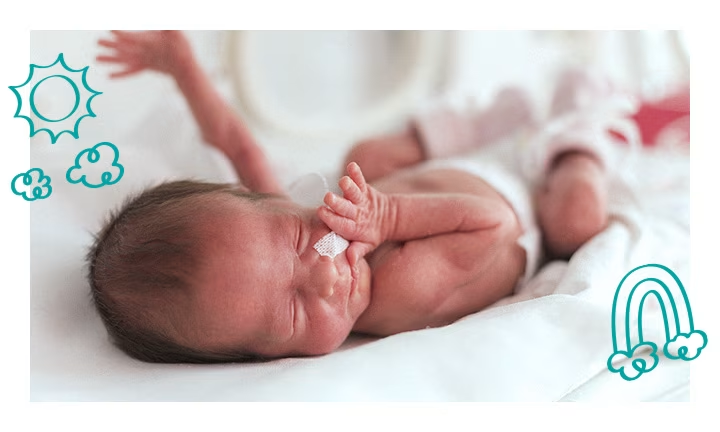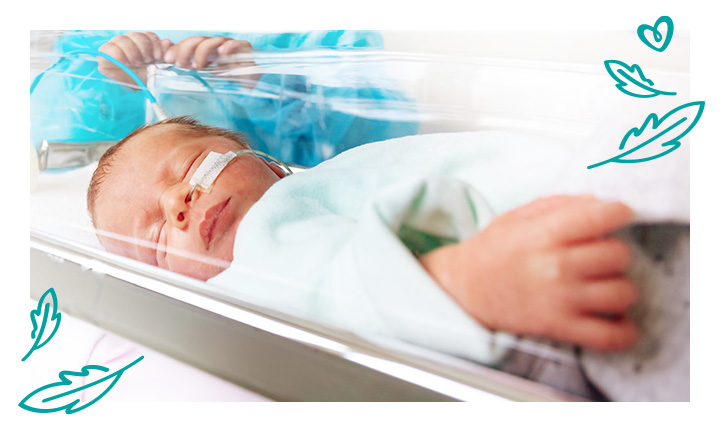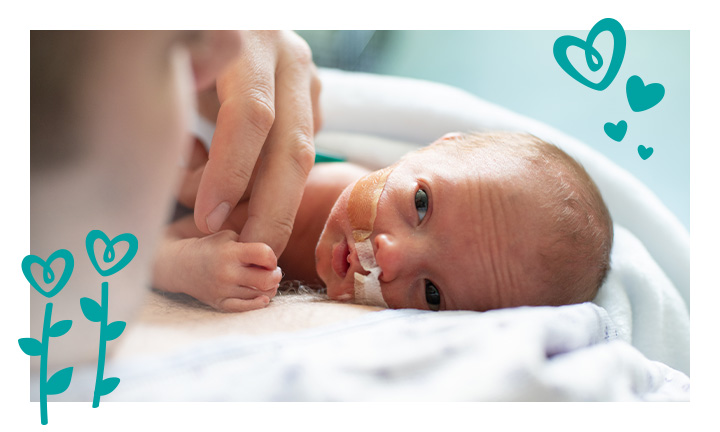
What is Neonatal Care and the Neonatal Intensive Care Unit (NICU)?
Every year, around 60,000 babies in the UK are born prematurely (before 37 weeks). Neonatal care units are specialised units in a hospital that provide a range of services for premature and sick newborns, from intensive care in the NICU for critically ill infants to routine care for healthy newborns. Neonatal care units are staffed with a team of professionals, each with specialised skills and knowledge. In this article, we will explore the different types of neonatal care units and the levels of care that you can expect daily, as well as how the neonatal care team supports you and your baby.
What is Neonatal Care?
Neonatal care is provided for babies born prematurely, with low birth weight or in need of medical attention. The meaning of the word neonatal is ‘newborn’, therefore, neonatal care is all about providing care for your new arrival – especially if they arrived into the world a little early.
Neonatal staff in all levels of neonatal care – from low dependency to NICU – will support and work with you to ensure your baby has the best possible outcome. They will also provide you with the support you need for transitioning from one level of care to the next or to another speciality, or from the hospital to home, so you can feel confident and comfortable as your baby’s primary caregiver.
Which Babies Need Neonatal Care?
As mentioned above, some newborn babies need neonatal care, provided by the neonatal unit in a hospital. Here are some of the reasons your baby might need specialist neonatal care:
Levels of Neonatal Care
Different levels of neonatal care may be required in a neonatal unit, depending on your baby’s needs and the type of specialised care they need. The level of your baby’s care may also change during their time in the hospital as their needs change. Read on to find out the different levels of neonatal care in UK hospitals and the difference between high-dependency unit and NICU:
Remember, the neonatal care staff can help you further understand the level of care that your baby needs and discuss any changes in your baby’s condition during their stay in the neonatal care unit.

What Happens in a Neonatal Care Unit?
The neonatal environment can seem overwhelming; however, the staff are very aware and are trained to support you and your family during your journey. We have gathered some important information about neonatal care units to help you understand more about the staff, equipment, and how your baby will be cared for.
What Do Neonatal Staff Do?
During your baby’s time in a neonatal care unit, you will get to know some of the staff members that oversee your baby’s care. The nurses are with the babies 24/7, and parents and families will be encouraged and supported to be part of the team. Here’s a list of the staff you may meet and their role within the neonatal unit:
On top of that list, other important faces and roles within the neonatal care unit include the porters and cleaners, clerical staff and the chaplaincy team. Remember, the neonatal care team are always there to support you and answer any questions or concerns you may have.
What Equipment is Used in a Neonatal Care Unit?
We have listed some of the equipment you may see around the neonatal unit. Some of it is used to keep babies warm, help them breathe or monitor their vital signs, etc. For a more in-depth look at the equipment in a neonatal care unit, read our article all about NICU equipment.
Tests and Procedures for Preterm Babies
The number of procedures and check-ups a baby may go through in a day depends on their needs. The neonatal team will work with you to decide on the best care for your baby and should always ask for consent before tests and procedures whenever possible. You may also be encouraged to be with your baby during any test.
Depending on your baby’s needs, here are some of the tests they may need:
The neonatal team will explain any tests and procedures in detail to you.
A Safe And Peaceful Environment
Premature or sick babies need a calm, peaceful and safe environment in which to rest and recover. They will spend 90 percent of their time sleeping, compared to 75 percent in the average full-term newborn – this sleep helps their development and recovery. Here are a few ways in which a safe and peaceful environment is promoted in the neonatal unit:

Forming Close and Loving Relationships With Your Preterm Baby
It’s natural to feel apprehensive when your baby is in the neonatal care unit and many parents want to know what they can do to help so they can form a close and loving relationship with their baby. And it’s not just parents that feel the strain, siblings of your preterm baby may also feel excluded or confused, and will benefit from being part of their sibling’s journey from the start and throughout. From feeding to nappy changes, here are a few ways you can help build that special relationship:
1. Skin-to-Skin Contact
We often underestimate the power of touch; but when your baby is in the neonatal unit, you will start to see the benefits of touch. Also called ‘Kangaroo care’, skin-to-skin involves holding your baby on your bare chest so both your skin is touching. These special moments can help form that loving relationship, and can also help to calm your baby.
The neonatal staff will support you with skin-to-skin as soon as possible. In many units, delivery room cuddles are being offered now. You can find out more information on this special bonding method in our article, Every Touch is Huge.
2. Feeding
Whether you choose to breastfeed or use formula in the neonatal unit, you will be supported throughout. The neonatal staff will help you to express your milk and feed your baby, or you may wish to use donor milk or formula. Skin-to-skin contact may also help to support feeding.
3. Changing And Skin Care
As you are the primary caregiver and the best possible person to care for your baby, the neonatal staff will inform, support and work with you to ensure you feel confident and have the skills in all aspects of caring for your baby, including, bathing your baby and changing nappies.
For more information and tips on changing and bathing your little one, read our article on How to Care for Your Preterm’s Skin.
4. Just Being There
Just being there, next to your baby makes a world of difference – even if you can’t physically touch them yet. Your baby will be able to recognise your voice and scent, and you will be encouraged to sing, read or simply talk to them. These simple things can reassure both you and your baby and help to form that special relationship you may be longing for.
Some Emotions You May Feel
It may be difficult to fully prepare yourself for the emotions you may feel during this period. Many parents and siblings experience a range of emotions and responses during this journey.
Here are some more things that you (and your partner or close family members) can try to help you cope with the arrival of your preemie and life in the NICU:
Remember, you may feel a rollercoaster of emotions – you’re not alone! And your neonatal care team are there for you every step of the way.
“I feel lucky in so many respects, I have a great family but if I’d known one other person in a similar situation to me, I’d have felt more equipped to deal with it mentally. My biggest hope is that our story offers comfort to anyone going through what we went through because it’s a traumatic event that can leave you feeling very lonely.” Rebekah, Preterm Parent
Next Step of the Journey
You may be waiting for that joyful yet nerve-wracking day when you’re able to take your baby home or transition to the next part of your journey.
When your baby leaves the hospital with you depends on their individual situation and medical needs. Sometimes a preterm baby will be moved to a different level of care within the neonatal unit or repatriated nearer home. For a preterm baby to go home, they need to be able to regulate their own body temperature, their feeding and weight will be on track, and the parents will be supported to continue their care at home.
From the start, the neonatal care team will work with you to build your skills, prepare you for going home and ensure you are confident in all aspects of your baby’s care.
You can learn all about taking care of a premature baby at home in our informative article – because we know that preterm care goes beyond the hospital.
FAQS AT A GLANCE
The NICU (neonatal intensive care unit) is a unit in a hospital for premature or sick babies. Babies in the NICU usually have the highest need for care, for example, if your baby was born before 28 weeks gestation, has an extremely low birth weight (less than 1500 grams), or is very unwell.
How We Wrote This Article The information in this article is based on the expert advice found in trusted medical and government sources, such as the National Health Service (NHS) and is written in collaboration with Claire Campbell, Neonatal Care Coordinator, NHS Northern Neonatal Network. You can find a full list of sources used for this article below. The content on this page should not replace professional medical advice. Always consult medical professionals for full diagnosis and treatment.
- Preemies Insight Generation: North American Key Insights & Findings
- https://www.bliss.org.uk/parents/in-hospital/about-neonatal-care/being-a-parent-on-the-unit
- https://www.bliss.org.uk/parents/in-hospital/about-neonatal-care/equipment-on-the-unit
- https://www.bliss.org.uk/parents/in-hospital/about-neonatal-care/how-does-neonatal-care-work
- https://www.bliss.org.uk/parents/support/impact-mental-health-premature-sick-baby/getting-support-mental-health/looking-after-your-mental-health-on-the-neonatal-unit
- https://www.bliss.org.uk/research-campaigns/influencing-policy-and-working-in-parliament/neonatal-leave-and-pay-campaign
- https://www.bliss.org.uk/parents/in-hospital/about-neonatal-care/neonatal-staff-and-what-they-do
- https://www.bliss.org.uk/research-campaigns/neonatal-care-statistics/prematurity-statistics-in-the-uk
- https://www.bliss.org.uk/parents/in-hospital/about-neonatal-care/routines-on-the-unit
- https://www.bliss.org.uk/research-campaigns/neonatal-care-statistics/statistics-about-neonatal-care
- https://www.bliss.org.uk/parents/in-hospital/about-neonatal-care/tests
- https://www.bliss.org.uk/parents/in-hospital/about-neonatal-care/what-is-neonatal-care
- https://www.liverpoolwomens.nhs.uk/our-services/neonatal-care/what-is-neonatal-care/#:~:text=Neonatal%20means%20'new%20born'.,condition%20that%20requires%20specialised%20treatment.
- https://www.ouh.nhs.uk/patient-guide/leaflets/files/38249Pequipment.pdf
- https://mft.nhs.uk/app/uploads/sites/4/2018/04/Bliss-Going_Home_-_The_Next_Big_Step-2012-1.pdf
- https://www.royalfree.nhs.uk/services/services-a-z/childrens-services/neonatal-units/visiting-hours-and-location/#:~:text=Visiting%20our%20neonatal%20units,visit%20between%202pm%20and%207pm.
- https://www.stanfordchildrens.org/en/topic/default?id=the-neonatal-intensive-care-unit-nicu-90-P02389
- https://www.pampers.co.uk/prematurity/premature-babies/article/premature-babies-development
- https://www.tommys.org/pregnancy-information/premature-birth/how-long-do-you-stay-in-hospital-after-birth/kangaroo-care
- https://www.tommys.org/pregnancy-information/pregnancy-news-blogs/what-we-can-learn-parents-premature-babies
- https://www.tommys.org/pregnancy-information/premature-birth/your-role-in-caring-for-your-premature-baby
Read more about Prematurity
Related Articles
Join Pampers Club and get:





